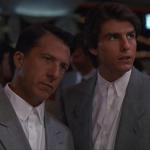It has become a truism—especially in religious studies classes—to note that baseball is like religion. And when I teach RN 101 courses, I bore myself as I demonstrate the similarities between the ballpark and the cathedral. At a baseball game—as in church—we sing hymns together, we stand up in unison, we pray, we eat bread, we drink wine (or beer), and we don’t leave until after Communion … or after the seventh inning if our team is down by more than five.
Yes, yes. I get it.
But the metaphor frays around the edges quickly. Sometimes, a ground-rule double is not transubstantiation. It’s just two bases. And the way advertisers beef up Yankee/Red Sox games with umpteen commercials for TD Bank, Amica Insurance, and a ridiculous number of auto-glass repair shops, an 11-4, error-filled “battle” between Bartolo Colon and John Lackey feels more like a tax audit than a trip to the mountaintop. (And by the way, how often do windshields break in Massachusetts?)
Further, I’ve always hated the way some movies labor to portray the game as a high spiritual exercise. The worst offender is the maudlin Field of Dreams, a Kevin Costner vehicle that I love despite myself.
Is this heaven?
No, it’s Iowa.
No, seriously. It’s just f*&%ing Iowa.
Baseball is a great game. But it’s not a mystical ascent, a hajj to Mecca, or a glimpse of nirvana. It’s wood and leather and dirt and drunk fans and big-ego HGH-sippers who feel entitled to nine-figure contracts as payment for their doping. It’s not religious.
Well, maybe sometimes it is. In fact, it was with thoroughly unexpected surprise that I found glimmers of the numinous peeking through the seams of what should have been the most irreligious baseball movie ever made: Moneyball.
Here’s the trailer, just in case you haven’t seen it already:
This thoughtful, elegant piece, based on a book of the same name, tells the story of the 2002 Oakland Athletics. Its thesis is simple: in the richer-take-all world of big cash baseball, a statistical approach to player acquisition can turn a poor also-ran into a contender.
In 2001, the A’s go to the divisional series in part by riding Jason Giambi, Johnny Damon, and Jason Isringhausen—rising stars who leave for bigger contracts at the end of the season. Upon learning from his owner that the team can’t afford to replace such expensive talent, manager Billy Beane (Brad Pitt) turns to the numbers to find undervalued players.
With the help of Peter Brand (in a likable, understated turn by Jonah Hill), an Ivy-League whiz kid, Beane makes the A’s competitive by narrowly focusing on on-base percentage. Don’t worry about flashy players, says Brand, or players who hit the ball hard, or “five-tool” phenoms; get guys who can get to first—by any means necessary. (In the book, the system is more complex—and impressive. But the film must compress for time and drama.)
And eventually, the A’s win. With a trifling $40 million-dollar payroll, they put together a 103-win season and return to the divisional series. (By contrast, the 2002 Red Sox spent $108 million on their roster and did not make the playoffs.)
By this brief summary, Moneyball should be the least religious baseball film ever made. It’s a math movie. Brand and Beane wring the transcendent from America’s game, reducing it to a spreadsheet—all ratios and percentages. And the team’s other scouts—grizzled prophets from an earlier age of player development—are artifacts of a dead faith.
Nonetheless, Moneyball shows Beane as (rightfully) superstitious regarding his mathematically sound roster. The manager will build his team and even coach them, but he won’t listen to or watch their games. It’s unlucky. When the A’s are on, Brad Pitt goes to the gym.
(During the first of these workout scenes, I realized why my wife suggested we go see Moneyball last night.)
He keeps his habit (religiously) through the first nineteen games of the ’02 A’s record-breaking 20-game win streak. Only in the twentieth game does Beane—accidentally learning that the team has taken an early eleven-run lead—head up to the ballpark to watch what will be his crowning achievement. And what happens? The A’s promptly give up all eleven runs.
Even in statistical baseball, the gods can still dip their fingers in the drink and stir.
Reflecting on the streak later with Brand, Beane weightily asks what it all means. It’s a trite question, but the filmmakers let it ripple in awkward silence for just long enough to make it substantial.
Beane ultimately demurs, claiming that the wins will mean nothing without a World Series ring to back them up. But the film is too tactful to state outright the other “meaning”:
A twenty-game win streak means that baseball is magic.
Statistics tell us that such a streak in the majors is impossible. Too many variables keep any one team from stringing together so many victories. And yet in 2002, the most statistically determined team in history bucked math and delivered a miracle.
And that’s a religious fact that Moneyball only tacitly acknowledges. Or more properly, it lets the miracle pass by in reverent silence. Thus, I love the scene when the unlikely hero Scott Hatteberg hits the home run that seals the streak. It is a polar opposite to the meretricious spectacle of Roy Hobbs’s homer in The Natural, with its exploding light bank and its tremulous soundtrack:
In Moneyball, Hatteberg’s scorching drive floats out of the Coliseum in dead silence.
Which is really all that we can do when faced with spiritual experience. Awe. As Job replies to the deity in the whirlwind—beautifully addressed by Dr. Herling last week—“I put my hand over my mouth” (Job 40:4).
We do the godhead a disservice when we compare it to a ninth-inning rally; and this is from a guy who was there for the Mother’s Day Miracle:
We can’t say anything about the true core of religion. It escapes our descriptive powers. We can just watch it fly out of the park.
It has become a truism—especially in religious studies classes—to point out that baseball is like a religion. And when I teach RN 101 courses, I now bore myself when I point out the similarities between the ballpark and the cathedral. At a baseball game—as in church—we sing hymns together, we stand up in unison, we pray, we eat bread and drink wine (or beer), and we don’t leave until after Communion … or after the seventh inning if our team is down by more than five.
Yes, yes. I get it.
But as the years have passed, the metaphor has frayed at the edges. Sometimes, a ground-rule double is not transubstantiation. It’s just two bases. And the way advertisers beef up Yankee/Red Sox games with umpteen commercials for TD Bank, Amica Insurance, and a ridiculous number of auto-glass repair shops, an 11-4, error-filled “battle” between Bartolo Colon and John Lackey feels more like a tax audit than a trip to the mountaintop.
Further, I’ve always hated the way some movies labor to characterize the game as a spiritual exercise. The worst offender is the maudlin Field of Dreams, a Kevin Costner vehicle that I love despite myself.
http://www.youtube.com/watch?v=C8-B5cyfK6A
Is this heaven?
No, it’s Iowa.
No, seriously. It’s just fucking Iowa.
Baseball is a great game. But it’s not the same as a mystical ascent, a hajj to Mecca, or a glimpse of nirvana. It’s a game.
Thus, it was with unexpected surprise that I found subtle glimmers of the numinous peeking through the seams of the elegant new baseball movie, Moneyball.
Here’s the trailer, just in case you haven’t seen it already:
The film, based on a book of the same name, tells the story of the 2002 Oakland Athletics. Its thesis is simple: in the richer-take-all world of big cash baseball, a statistical approach to player acquisition can turn a poor also-ran into a contender.
In 2001, the A’s went to the divisional series in part by riding the talents of Jason Giambi, Johnny Damon, and Jason Isringhausen—rising stars who all left for bigger contracts at the end of the season. Upon learning from his owner that the team couldn’t afford to replace its best talent, manager Billy Beane (Brad Pitt) turned to the numbers to find undervalued players.
He does so with the help of Peter Brand (in a likable, understated turn by Jonah Hill), an Ivy League-educated whiz kid who argues that Beane can keep the A’s competitive by putting a laser-focus on on-base percentage. Don’t worry about flashy players, says Brand, or players who hit the ball hard, or “five-tool” phenoms; get guys who can get to first—by any means necessary. (In the book, the system is much more complex—and impressive. But the film must compress for time and drama, as a two-hour stats lesson probably wouldn’t sell too many tickets.)
And eventually, the A’s win. With a trifling $40 million-dollar payroll, they put together a 103-win season and return to the divisional series. (By contrast, the 2002 Red Sox spent $108 million on their roster and did not make the playoffs.)
By this brief summary, Moneyball should be the least religious baseball film ever made. It’s a math movie. Brand and Beane wring the numinous from America’s game, reducing it to a spreadsheet—all ratios and percentages. And the film characterizes the team’s other scouts—grizzled prophets from an earlier age of player development—as artifacts of a dead religion.
Nonetheless, the film depicts Beane as (rightfully) superstitious. The manager will construct his teams and even coach them a bit, but he won’t listen to or watch their games. It’s unlucky. When the A’s are on, Brad Pitt goes to the gym and works out.
(During the first of these scenes, I realized why my wife suggested we go see Moneyball last night.)
He keeps his habit (religiously) through the first nineteen games of the ’02 A’s record-breaking 20-game win streak. Only in the twentieth game does Beane—accidentally learning that the team has taken an early eleven-run lead—head up to the ballpark to watch what will be his crowning achievement. And what happens? The A’s promptly give up all eleven runs.
Even in statistical baseball, the gods can still dip their fingers in the drink and stir.
Reflecting on the streak later with Brand, Beane weightily asks what it all means. It’s a trite question, but the filmmakers let it ripple in awkward silence for just long enough to make it substantial.
Beane ultimately demurs, claiming that the wins will mean nothing without a World Series ring to back them up. But the film is too tactful to state outright the other “meaning” of a twenty-game win streak:
A twenty-game win streak means that baseball is magic.
Statistics tell us that a twenty-game win streak in the majors is impossible. Too many variables keep any one team from stringing together so many victories. And yet in 2002, the most statistically sound team bucked math and delivered a miracle.
And that’s a religious fact that Moneyball only tacitly acknowledges. Or more properly, it lets the miracle pass by in reverent silence. Thus, I love the scene when the unlikely hero Scott Hatteberg hits the home run that seals the streak. It is a polar opposite to the meretricious spectacle of Roy Hobb’s homer in The Natural, with its exploding light bank and its tremulous soundtrack:
In Moneyball, Hatteberg’s scorching drive floats out of the park in dead silence.
Which is really all that we can do when faced with real religious experience. Awe. As Job says in reply to the whirlwind—beautifully addressed by Dr. Herling last week—“I put my hand over my mouth.”
The best thing we can say about the godhead is not that it resembles a ninth-inning rally; and this is from a guy who was there for the Mother’s Day Miracle:
http://scores.espn.go.com/mlb/recap?gameId=270513102
http://www.youtube.com/watch?v=2ClclZASorY
We can’t say anything about true religion. It escapes our ability to describe it. We can just watch it fly out of the park.











